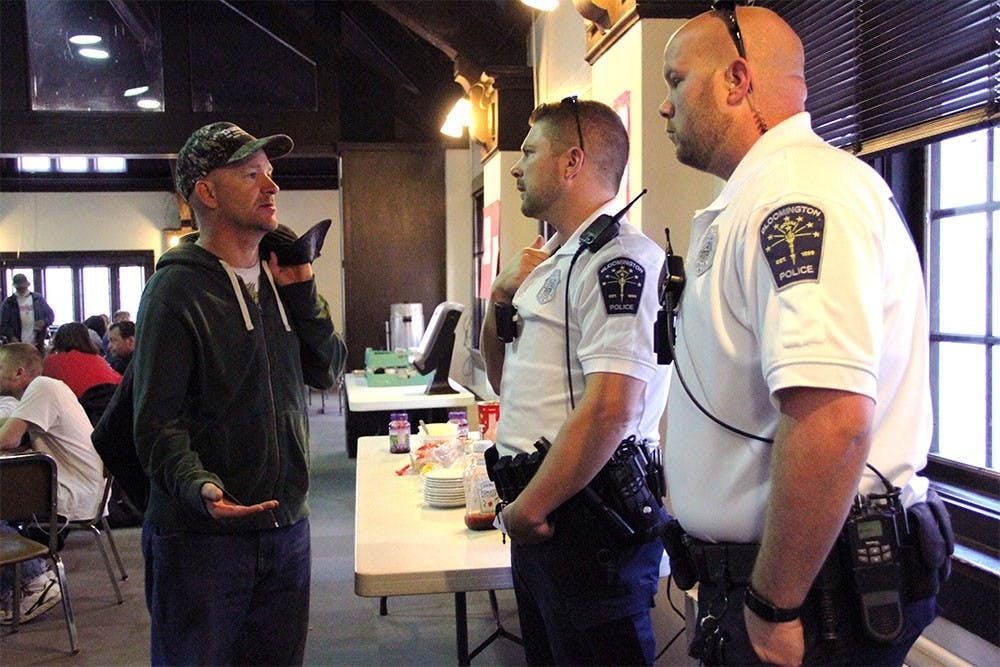The shouting echoed off the concrete walls. Two white-shirted police officers stepped out of their white SUV and approached the source of the disturbance.
The Sunday morning commotion was from two regulars, as the officers put it. They tightened their jaws and jammed their hands into their belts as they turned the corner into the alley.
About eight people with torn clothes, scraggly beards and dirty fingernails stood between the two buildings.
The tension in the air grew as some of the alley-dwellers turned away from the approaching officers and others hardened their expressions.
“Is there a reason why there’s all this screaming?” said Brett Rorem, an officer with the Bloomington Police Department.
“It’s a free country,” one of the alley-dwellers said in reply.
“I’m not arguing that this is a free country,” Rorem said. “I’m asking you why you’re screaming.”
The officers were patrolling the First Christian Church, which has asked the police to make rounds in the morning when they offer food to the homeless due to increasing conflicts.
This was exactly what Rorem and BPD Officer Robert Skelton volunteered for.
The two are part of Bloomington Police Department’s Downtown Resource Officer program, which is a group of BPD officers who volunteer to exclusively handle any homeless issues in the local downtown area.
Skelton and Rorem were able to quell the uproar of voices without arrest or conflict, which is the purpose of the program.
The officers said they prefer to end situations this way, but it is not always the case.
The screaming and explicit language that occurred in the alley next to the church is not extremely common, at least not to that degree, the two said.
The rowdy crowd was rowdier Sunday morning.
“This is how simple, stupid things start,” Rorem said.
A small staircase on the side of the church led up to a man with a broken guitar, a struggling ex-drug addict and a room full of open newspapers and coffee.
Thomas Thompson’s brown Washburn guitar lay on a shelf. The neck was snapped off, held together by strings. The body was held together with duct tape.
Thompson is a board member of the Interfaith Winter Shelter.
His name tag was upside down as he shook the hands of Rorem and Skelton and offered a jovial greeting.
“They’re always helpful,” he said. “They show their faces so people can say, ‘Oh it’s so-and-so,’ instead of a cop.”
Thompson is a retired addiction therapist, which is an issue from which Jamie Voci, an attendee at First Christian Church’s Sunday morning breakfast, is working to recover.
Voci and the officers had a long conversation in the church-turned-café.
The two men have had their problems in the past. Voci used to cause regular issues for the officers, but Voci said he has learned to see the officers in a different light.
“I acted out a few times and Officer Rorem helped me to be accountable for my own actions,” Voci said. “I had no respect for authority, but now I see them as more of a blessing to the public instead of the bad guys. They changed my life, you know. Now I’m making an honest effort to change.”
Skelton begins every day at 7 a.m. by waking up with his kids for breakfast. Wearing his white shirt, he comes into work at noon to start the second shift.
While working in Bloomington, Skelton joined the Downtown Resource Officer program in January.
For him, it was a calling from something higher than a badge.
“I’m a very religious person,” Skelton said. “God said to help those in need, and I can get paid to do what I’m supposed to do biblically.”
The thrill of adventure and an avoidance of cubicles and monotony drew Rorem to the badge. He joined the homeless program in January 2014.
It was, again, the allure of excitement and a break in the patterns that brought him to volunteer for the position.
Even though the officers speak to the transient population civilly, have cell phones for them to use and provide them with Meals Ready to Eat, soap and shampoo, some members of the population still despise them, the officers said.
“We’re normal people,” Rorem said. “Unfortunately, we deal with other people in the worst part of their lives.”
Rorem and Skelton quipped on each other consistently in the car on the way to their next stop.
Rorem referred to Skelton as Roberta at one point, and the officers discussed eggs benedict and the biscuits and gravy from Runcible Spoon.
They stopped at a backstreet behind Nick’s English Hut where transient members of the community used to gather.
The alley behind Nick’s has since been blocked by gates and has bright lights, but the officers make periodical checks to confirm there aren’t any loiterers.
When homeless people gather, it may start with one or two people in an alley, but it can quickly turn into 10 or 15, Rorem said.
When that many people gather behind a restaurant, there can be a mess of garbage and human defecation that must be cleaned, he said.
“How many times have you drank a beer at Nick’s or sunk the biz and thought, ‘Oh, I wonder if there are homeless people out there?’” Rorem said.
On Sunday morning, the officers spent much of their time in their SUV and patrolled between buildings, awaiting any sign of movement.
They noticed a man digging though the garbage in an alley between Washington and Walnut streets.
The SUV drove past him as his eyes darted up.
After passing him, the SUV stopped before slowly backing up so the front windows faced the man wearing an oversized T-shirt and standing among black and white bags, beer can boxes and decaying food.
The man hung his head as Skelton rolled down his window.
“Doing all right?” Skelton said. “Getting cans or what?”
After several rambling excuses, the officers instructed him to throw the excess trash away and confirmed that he had permission from the owner to rifle through the garbage.
After they were finished, Skelton wished him good luck and the white SUV pulled away.
The man plunged his head and arms back into the bag to salvage whatever he could.
Skelton and Rorem still respond to ordinary calls if they are in the immediate area, but for their specific job, it’s a bit different.
Instead of seeking to arrest members of the transient community, the officers’ goal is to reason with them and stop situations before they escalate, they said.
Arresting someone only solves a problem for eight hours, Rorem said.
However, sometimes arrests are necessary if the officers aren’t able to calm the people with whom they interact.
“If they continue to yell and scream, you gotta do what you gotta do,” Skelton said. “Some people just gotta go to jail.”
Other officers in the police department are sometimes frustrated with the Downtown Resource Officer program because they could use the officers’ help on normal issues, Skelton said.
However, he said they stop a lot of calls from having to occur and that most of the other officers understand that.
BPD Chief Michael Diekhoff started the program, so the officers said they have an immense amount of support from the station.
Their work takes them down Kirkwood Avenue, into back alleys and all through the downtown area where they meet and build relationships with the transient populations.
They call them the white shirts.
Those two words echoed as Skelton and Rorem turned the corner into the alley outside the church.
“The white shirts are here.”






